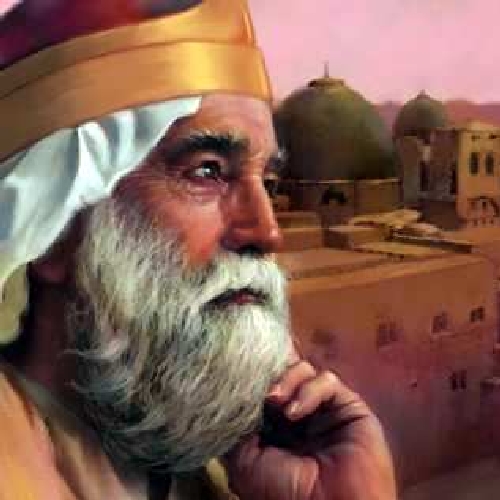Names of the Book
| English: | Ecclesiastes |
| Hebrew: | קהלת |
| Transliterated: | Qohelet |
| Other names: |
 Who
Who
| Wrote the book: | Solomon |
| Are the key people: | Solomon |
| Is it written to: | The people of Israel |
 What
What
| The Creation and the story of Adam (Genesis 1:1-5:32) |
| The Flood and the story of Noach (Genesis 6:1-11:32) |
| The Promise and the story of Avraham, Yitzchak, and Yaakov (Genesis 12:1-36:43) |
| The Salvation and the story of Yosef (Genesis 37:1-50:26) |
 When
When
| Was it written: | c 970-961 BCE |
| Did the events occur: | c 1000-961 BCE |
| Was it canonized: | c 499-100 BCE |
| (see the Timeline of the Tanakh) | |
 Where
Where
| Was it written: | In Jerusalem |
| Did the events occur: | The Land of Israel |
 Why
Why
| Ecclesiastes was written to inform us that: |
| Life is meaningless apart from G-d. |
| We should fear G-d and keep His commandments (Ecc 12:13). |
 Introduction
Introduction
Ecclesiastes is the third book of what is generally categorized as wisdom literature. Traditionally attributed to Solomon, this book contains reflections of an old man, called "the Preacher". As he ponders the meaning of life, he looks back and is reminded of the futility of seeking even the good things that this life can offer such as wisdom, work, pleasure, and wealth. The satisfaction that even those good things can bring is certain to end at each person's death. The Preacher exhorts his readers to live in the fear of the Lord so they can enjoy G-d's good gifts. The writer ends the book succinctly with this: The conclusion, when all has been heard, is: fear God and keep His commandments, because this applies to every person. (Eccl 12:13)
Scripture- Book Selection
| Chapter | Description |
| 1 | "The Preacher" declares that all is vanity and that there is nothing new under the sun. He pursues wisdom and discovers that, in the end, it is like striving after the wind: there is no end. |
| 2 | The Preacher pursues pleasure and discovers that, in the end, it was futility. He pursues his works and discovers that, in the end, there was no profit in it. While wisdom excels folly, the fate of the fool is the same as the wise. |
| 3 | There is an appointed time for everything, for every event under the sun. G-d has set eternity in the hearts of men. Everything G-d does will stand forever but the works of men will pass away just as men, themselves, do. |
| 4 | The Preacher observed the oppressor and the oppressed and discovered no comforter for either. He examined every labor and skill and discovered the balance of labor and rest is better than unceasing labor. Two laboring together is better than one. |
| 5 | The Preacher says to guard our steps going before G-d and to be cautious bringing up a matter in the presence of G-d. Honor your vows to G-d and do not allow your speech to cause you to sin. Money does not satisfy: a man comes naked from the womb and so will he return to his Maker. It is good and fitting to drink and enjoy oneself in one's labor. |
| 6 | There is a prevalent evil among men: a man has riches and honor but G-d does not allow him to enjoy them but gives them to a foreigner. It is better to have never been born than to live in obscurity. |
| 7 | Sorrow is contrasted with laughter. The end is better than birth. The mind of the wise is in the house of mourning but the mind of the fool is in the house of pleasure. The excessive pursuit of righteousness is useless. Wisdom is unattainable. |
| 8 | Keep the command of the king at the proper time. Mankind cannot discover anything on their own. |
| 9 | Righteous men, wise men, and their deeds are in the hand of G-d. There is one fate for the righteous and for the wicked. Wisdom is better than folly. |
| 10 | G-d's work is beyond understanding. Folly is set in many exalted places but rich men sit in humble places. |
| 11 | The preacher speaks in a rising crescendo of despair: there is good but it flees from men throughout their lives. |
| 12 | Remember your Creator while you still have life. "All is vanity", says the Preacher. The conclusion is this: fear G-d and keep His commandments. |
